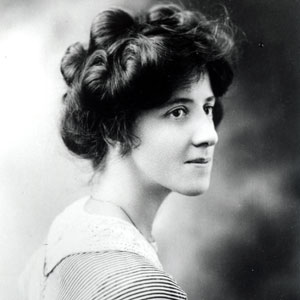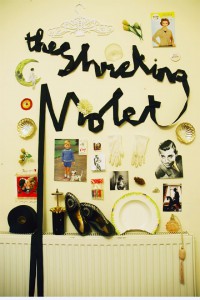Modernist heroines to be celebrated
Article published: Tuesday, January 25th 2011
To mark the 100th Anniversary of International Women’s Day a trio of cultural groups from Manchester are embarking on a collaborative project which will celebrate a century of Modernist women. Centring on heroines hailing from the region, it will take the form of a creative publication alongside activities and events – and the organisers are calling on you to get involved.
The project – which is being run by Manchester Modernist Society, urban explorers and psychogeographers the Loiterers’ Resistance Movement and the Shrieking Violet fanzine – will coincide with International Women’s Day on March 8.
The aim is to produce a publication and organise a range of activities in early March focused on or inspired by the lives and careers of ten local heroines strongly associated with the North West. The ten figures chosen span the fields of invention, aviation, media, science and design and architecture in the twentieth century and were selected due to their outstanding contributions in their respective disciplines.
The organisers are now calling on the creative responses of anybody who is interested. Contributions can take the form of an event, performance, piece of creative writing, interview or journalistic feature – the only rule being that the work be about one of the ten local heroines.
The deadline for expression of interest is this Friday 28 January, while the date for final submission of work is Friday 18 February in order to allow time for print and publicity before the week starting March 6. Please email info@manchestermodernistsociety.org in the first instance with your choice of Fabulous Female and a short summary of the idea you might wish to pursue.
Below is a full list of the ten local heroines chosen to be represented in the project:
1. Mitzi Solomon Cunliffe (January 1 1918 – December 30 2006) was an American sculptor who was a long resident in Didsbury. She was most famous for designing the golden trophy in the shape of a theatrical mask that would go on to represent the British Academy of Film and Television Arts and be presented as the BAFTA award. She also designed the mural on the Heaton Park Pumping Station.
2. Winifred Brown, Salfordian Flyer and, in her early 20s, winner of the Kings Cup (air race) in 1930.
3. Rachel Haugh co-established the architectural practice Ian Simpson Associates. She was born and brought up in Manchester and studied at Bath University School of Architecture. She is a founding partner and co-director of Ian Simpson Architects, a design-led architectural practice which was established in 1987 and employs around 50 people in offices in Manchester and London.
4. Susan Sutherland Isaacs (1885–1948) was a Bolton born educational psychologist and psychoanalyst. Educated at Manchester and Cambridge Universities, she published pioneer studies on the intellectual and social development of children and promoted the nursery school movement. For Isaacs developing a child’s independence, which is best achieved through play, was the best way for children to learn and the role of adults and early educators was to guide children’s play. She was awarded a CBE in 1948.
5. Marie Stopes (15 October 1880 – 2 October 1958) was a noted palaeobotanist, campaigner for women’s rights and pioneer in the field of family planning. She was the first woman member of faculty at Manchester University.
6. Professor Rosalie David is the world’s leading expert on Egyptian mummies. She is Director of the Centre for Biomedical and Forensic Egyptology at the University of Manchester and has directed the Manchester Egyptian Mummy Research Project since 1973. This project has pioneered the ‘Manchester Method’ — the use of medical and scientific techniques to investigate ancient Egyptian mummies to detect evidence of disease and information about everyday life in ancient Egypt. She was the first woman professor in Egyptology in Britain, and the first to receive an OBE in recognition of her services in Egyptology.
7. Olive Shapley, British radio producer and broadcaster (10 April 1910– 13 March 1999) was a British radio producer and broadcaster. In 1934 she began her career with the BBC as Children’s Hour organiser with the responsibility of producing five hour-long programmes every week. These included at least two full-length live plays a week. After the war she became the third presenter of ‘Woman’s Hour’, a programme with which she was associated for over twenty years, producing the programme between 1949 and 1953. Meanwhile, she began to develop a career as a presenter in the new television medium. In the mid-1960s her Manchester home became a refuge (as a charitable trust) for single mothers and later, in the late 1970s, for Vietnamese boat people.
 8. Professor Doreen Massey is a Manchester born contemporary British social scientist and geographer. She has devoted her life to the subject, speaking passionately about the significance of geography and the ‘politics of place’ in a globalised world. Her work has had a profound influence on theorising around space and place and has taken the study of geography into new inter-disciplinary directions.
8. Professor Doreen Massey is a Manchester born contemporary British social scientist and geographer. She has devoted her life to the subject, speaking passionately about the significance of geography and the ‘politics of place’ in a globalised world. Her work has had a profound influence on theorising around space and place and has taken the study of geography into new inter-disciplinary directions.
9. Mary Stott (18 July 1907 – 16 September 2002) was a British feminist and journalist, the first — and longest-serving — editor of the Guardian women’s page. One of the great campaigning journalists of the 20th century, in her 15-year tenure from 1957 to 1972 she invented a platform for women’s voices and concerns and used it to further such causes.
10. Linder Sterling studied Art at the Manchester School of Art from 1974-77 and played a vital part in the 1970s punk scene in Manchester, designing graphics for the Buzzcocks, Magazine and Factory Records. She remains a pivotal visual artist, performance artist and musician, whose work has been selected for the Tate Triennial.
More: Culture, Exhibition, Manchester, Stage
Comments
No comments found
The comments are closed.





